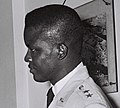List of officeholders
Liberia Frontier Force
| No. | Portrait | Name (born–died) | Term of office | Ref. | ||
|---|---|---|---|---|---|---|
| Took office | Left office | Time in office | ||||
| ? | Major General Alexander Harper | 1952 | 1954 | 1–2 years | – | |
| ? | Lieutenant General Abraham Jackson | 1954 | 1956 | 1–2 years | [1] | |
Armed Forces of Liberia
| Portrait | Name (born–died) | Term of office | Ref. | ||
|---|---|---|---|---|---|
| Took office | Left office | Time in office | |||
| Chief of staff | |||||
 | Lieutenant General Abraham Jackson | 1956 | 1960 | 3–4 years | [1] |
 | Lieutenant General George T. Washington (born 1928) | 1965 | 1970 | 4–5 years | [2] |
 | Lieutenant General Henry Korboi Johnson | 1970 | September 1979 | 8–9 years | |
 | Franklin J. Smith | September 1979 | 1980 | ||
 | Brigadier General Edwin Lloyd | ? | May 1980 | ? | [3] [1] |
| Commanding general | |||||
 | Brigadier General Thomas Quiwonkpa (1955–1985) | May 1980 | 1983 | 2–3 years | [3] |
 | Lieutenant General Henry Dubar | 1983 | 30 June 1990 | 9–10 years | [4] |
 | Lieutenant General Charles Julue | 30 June 1990 | 5 July 1990 | 5 days | [5] |
 | Lieutenant General Hezekiah Bowen (1943–2010) | 1990 | 1997(?) | 6–7 years | |
| Chief of staff | |||||
 | Lieutenant General Prince C. Johnson II (?–1999) | August 1997 | November 1999 † | 2 years, 5 months | [6] [7] |
 | Lieutenant General Kpengbai Y. Konah | 25 November 1999 | February 2006 | 6 years, 3 months | [7] [8] |
| Command officer-in-charge | |||||
 | Major General Luka Yusuf (1952–2009) | February 2006 | May 2007 | 1 year, 119 days | |
 | Major General Suraj Abdurrahman (1954–2015) | 6 June 2007 | 11 February 2014 | 6 years, 250 days | [9] |
| Chief of staff | |||||
 | Major General Daniel Dee Ziankhan (born 1971) | 11 February 2014 | 5 February 2018 | 3 years, 360 days | [10] |
 | Major General Prince C. Johnson III (born 1976) | 5 February 2018 | 5 February 2024 | 6 years | [11] [12] |
 | Brigadier General Davidson Fayiah Forleh | 25 March 2024 | Incumbent | 1 year, 134 days | [13] |